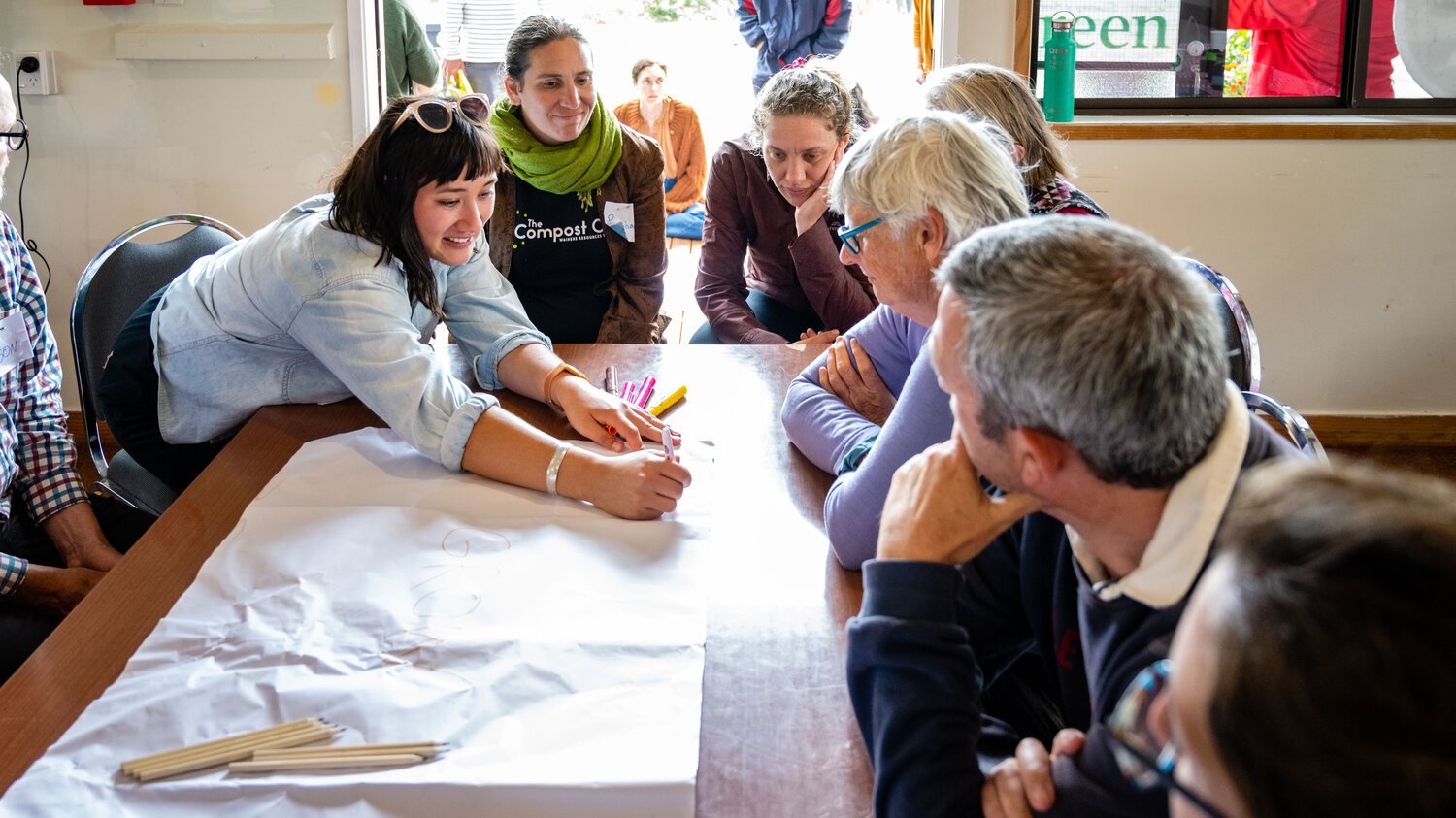A time to dig (and dig deep)
Te Kōanga (Spring): known as ‘the digging’ because for Māori the men would be digging the kumara fields at this time, while the tohunga—the ‘expert’ ensuring tikanga (customs) were followed—recited karakia (prayer, incantations). You probably feel it too, the digging. The time when gardeners are itching to grow things, sneaking out at any given moment to plant. Watching eagerly as seeds shoot to seedlings, heartbroken as snails eat said shoots, running out to bring things in from the rain, running out to put things out in the rain, and so on.
This year in Kōanga we’re digging a little deeper and finding strength as we continue to live with a pandemic with all our different circumstances that require new things of us. Dig a little deeper to share the kai with people that need it. Dig a little deeper to donate—if you can— to charities running on the smell of rescued food. Dig a little deeper to have the courage to ask for help because this time round you do need it.
The past two years have highlighted both the fragility and interconnectedness of our food system. From our workers in hospitality unable to open and serve like they do best; to our growers without pickers having to leave harvests to drop in the fields. Supply chains shocked. Jobs lost and suddenly the reality of putting food on the table changing. Working even harder than ever to get meals out to those in need, as the need grows.
There’s usually a flurry of energy in food from spring into summer as we hustle across the system to get work done. Not only because it’s farmers and growers in their productive elements, but also because ideas flow and so does the mahi (work) to get the wider work for the system done. What is that work? In a largely fractured and broken system now on top of a visible pandemic, there are many places to start.
Our global food system is mirrored nationally, regionally, locally, and micro-locally in your family unit or whānau. We see the same issues play out in other countries as we do here: reliance on unhealthy food, a system dominated by private food companies, rise in malnutrition and obesity, lack of access to affordable food, deteriorating soils and waterways in line with deteriorating human health but little policy or action that bridges that and holistically addresses both. The food system being affected by climate change while simultaneously being one of the biggest sectors to impact on the climate through greenhouse gas emissions. We see this because the globalised industrialised food system has done a great job of messing it up for everyone, everywhere. Over-selling, to profit under the guise of feeding the world.
Fortunately, we now also witness the growth and resurgence of solutions to these problems, popping up around the world. The prolific spreading of food rescue agencies gathering ‘wasted’ food from supermarkets and food service and redistributing it to those in need. Retraining of chefs and cooks in how to grow and make food more sustainably. The emergence of highly productive organic regenerative market gardens in small city and town spaces or on borrowed land. Conversion of farms to organic and regenerative practices. The call for policies that address nutrition and sustainable food production methods being taken up. Consideration of the role of greenhouse gasses in the food choices that people make. More ethical food choices around the raising of animals and fish harvests. Better packaging options. The push for up-to-date science around emissions and the role of animals. What we eat in terms of not only our climate change impacts but also the health of our soils and waterways.
At the end of September, the UN Food Systems Summit was held in New York (US), a diplomatic playing out of those discussions and solutions. Critiqued by many for not being inclusive or getting to the heart of the issues, it also marked the first time the full food system was the topic of such a high-level discussion. Nationally, at a snail’s pace—not the eager one going for your seedlings right now, the proverbial one—central government is beginning to think in such a way. The reason it hasn’t—aside from the dominance of private company interest in all things in the food chain for the last 70-80 years—is that it truly is difficult. The system sits across numerous (over 20 at last estimate) government departments and agencies, and local government functions, spanning health, environment, food safety, agriculture, fisheries, social, community, and the list goes on. Any overarching policy and action would require a serious overhaul of how things are done. It’s overdue but not going to happen anytime soon.
The onset of COVID-19 last year led to many initiatives and discussions emerging around food resilience, not only nationally but locally. Here on Waiheke, some of us who are passionate about food resilience and food sovereignty combined our superpowers to put on a hui last November. From the depths of several lockdowns, we had 100 people (capacity allowed at the time) at Piritahi Marae, sharing what resilience meant for Waiheke. Importantly we had the full system there: distributors, food businesses, nutritionists, dieticians, people working in health, food rescue agencies, gardeners, teachers, community gardens, and growers. The know-how and expertise spine tingling. Here on our little motu (island) was a group of people with as much to share as anywhere else I’ve seen in a food systems conversation.
Issues highlighted for Waiheke were: an inherent ‘freight tax’ on food being shipped over from the mainland leading to higher prices for food retailers and restaurants; cost of living increasing which leads to pressures on families to afford food; rising land prices leading to established gardens and growers subdividing and selling rather than growing food for local supply; lack of supply of produce and fruit grown on the island; oversupply of food at supermarkets leading to food waste; lack of commercial kitchen or other spaces to establish food businesses; lack of meat processing facilities on the island; along with some opposition to any form of animal consumption or said processing operations on the island.
We have several highly focused and skilled people working on actions mainly at a grass roots level. We have low density viticulture and farming practices with extensive re-planting of farmland into bush. Wineries and restaurants with productive gardens supplying their own menus and many more food businesses keen to support local food initiatives. Piritahi Marae māra kai (garden) producing seedlings and food, and a well run community garden networks across the island. A regular Crop Swap and the group Grow Waiheke, both with networks of growers. The Waiheke Co-op selling local growers’ produce and accessible and supportive local markets to sell food. Schools with children involved in Garden to Table growing and cooking incredible things. Seed savers, seed sellers, seedling and nursery growers. Food rescue by Waiheke Resources Trust along with its Kai Conscious Café and the free fridge at the Sustainability Centre, and the Compost Collective turning food scraps into soil. Waiheke Budgeting Services stepping up with food vouchers. Church groups supporting families with food parcels and soup kitchens. And some brilliant home growers and gardeners who share know-how across all those networks. Thank-you to you all!
We’ve formed a network called Kai Waiheke and we’re beginning to bring together people from across this food system with an intention to regularly meet up and connect to strengthen resilience. Like most of these initiatives, the solutions to the issues in the food system lean heavily on volunteerism, and the people involved are usually the same ones who are involved in many other things on the island. Fresh faces are welcome to join us!
But beyond that, my ask of you this Kōanga (Spring) is to continue to dig a little deeper on these topics. Look further to find out more about parts of the food system that trouble you. Ask more questions of your food stores when you want more ethical choices. Push back on food makers and get them to state their practices around climate change, soil, water, and animal welfare. Take the time to find out where and how your food is grown. Get to know your grower. Learn about the benefits of organic or regenerative or biodynamic or hua parakore (the Māori organics framework) and why they matter for the benefit of our soil and therefore our waterways.
If you have a garden, dig a little more this Kōanga and by that I mean extend the plot out (not to tread on the toes of any regenerative, no-dig, gardeners). (Once Alert levels allow) plant a garden for a neighbour who doesn’t have one, join a community garden working bee, volunteer at the māra kai on a Wednesday morning, or come to Crop Swap at the Waiheke Primary School every second Wednesday after school. Collect or donate food that would, otherwise, be wasted. Start something that adds to this mahi if you feel it’s missing or needed. The list to dig deeper goes on, as does the need to shift our approaches towards community food resilience beyond only thinking about our own food resilience. This is a time to dig and dig deep.
Emily King, Director of Spira
emily@spira.nz


